This year’s short list of novels, like the novella category, is a strong one, and like the novellas, the novels have a clear winner and a clear loser.
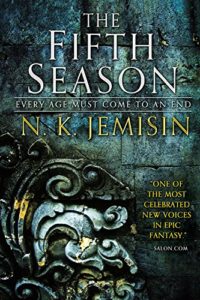
The winner: The Fifth Season by N.K. Jemisin. The Fifth Season is probably the best SFF novel, not of the year, but of the decade. Maybe it’s the best SFF novel of the century, although it’s still early. It’s pitch-perfect in nearly every way: the writing is lyrical in the right places and prosaic where it’s better brought down to earth; the fourth-wall-breaking brushstrokes and the shifts in viewpoint and tense are startling in exactly the right way; the characters are vividly drawn and the injustices of the world portrayed with nuance and moral strength. It’s long enough to do justice to its epic premise but not so long that the story drags. I could go on for days, but others have done so already.
Even more than that, The Fifth Season, like all Jemisin novels but more so, is a master class in world-building. The Fifth Season sits somewhere on the uncertain border between science fiction and fantasy, and manages to build the kind of world that both genres are meant to explore. It takes its unnatural premises – what if the world suffered extinction-level geological catastrophes every few centuries and certain people had inborn power to control the earth’s movements? – and spins them out into history, politics, social organization and material culture that seem natural. The Fifth Season’s world is lived-in and is obviously thought through to the smallest detail; it’s a world in which readers can immerse themselves and from which the hidden stories that lie behind every novel come to mind unbidden. This is a masterpiece, and nothing else on the ballot comes close to it.
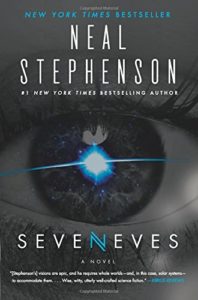
The loser: Neal Stephenson’s Seveneves. This is a book that people seem to love or hate, and I hated it. I’ll give Stephenson credit for ambition, but unlike Jemisin, he couldn’t make it work. The walking-stereotype characters and the overtones of racial essentialism in the final part were enough for me to put it below No Award – the only novel this year to achieve that honor – and the bad science made it worse. A word about bad science: hard SF authors often neglect the “soft sciences” such as sociology and linguistics, and Seveneves is a particularly bad example, all the more so since Anathem proves that Stephenson can extrapolate both hard and soft sciences.
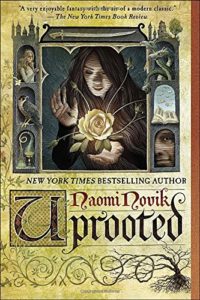
Of the remaining novels, Naomi Novik’s Uprooted easily takes the second-place slot. It’s a familiar fantasy with familiar tropes, but Novik manages to do a few new things with them. The writing is lucid, the setting well-realized, the characters sympathetic and well-drawn, the enemy evil and multi-faceted. The conflict is a genuine contest of will, with an enemy capable of learning from its setbacks; the Eastern European setting complements the overtones of myth and history; the story is unpredictable enough to keep up nearly constant suspense; the resolution is both unexpected and satisfying. In a year without The Fifth Season, I might easily have put Uprooted at the top of my ballot; as things stand, it’s a strong runner-up.
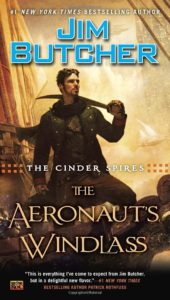
Jim Butcher’s The Aeronaut’s Windlass comes third. It’s an entertaining read: steampunk, flying ships and talking cats, what’s not to like? There are characters to root for and plenty of action. The single gratuitous political statement (about the Auroran enemy being driven to conquer because it has been bankrupted by its wasteful social-democratic ways) is mercifully short, and I suppose authors are allowed one of those every so often. But The Aeronaut’s Windlass is too long, the story lags in too many places, and in contrast to The Fifth Season, the setting isn’t fully realized and we see far too little of the strange world the characters inhabit. I like Butcher, but this isn’t his best, and I’m not sure I’d read the next book in the series.
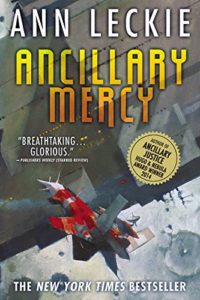
And finally, Ann Leckie’s Ancillary Mercy. I’ve never understood the appeal of the Ancillary novels – I’ve seen enough thoughtful rave reviews of them that I’m prepared to believe this is a failing of mine rather than Leckie’s, but I’ve never understood it all the same. Ancillary Mercy and The Fifth Season are both dense, but where Jemisin’s density is lucid, Leckie’s is opaque. Her world doesn’t permit easy entry, and she couldn’t make me care about her characters or about the conflicts running through their society. I can see the novel’s literary merit – no one would dispute that Leckie is a masterful writer – but I can’t sign up for the ride on which she wants to take us. Leckie can take comfort in the fact that many will no doubt rate Ancillary Mercy higher than I do.
1. The Fifth Season
2. Uprooted
3. The Aeronaut’s Windlass
4. Ancillary Mercy
5. No Award
6. Seveneves
7 responses to “Hugo Ballot: Novel”
Great writeup!
I feel a bit burned out on Neal Stephenson. Obviously, Snow Crash was his masterpiece, and Anathem was a worthy successor. The Cryptonomicon didn’t really move me but I did enjoy the Baroque Cycle. I took the plunge on Reamde and was very disappointed (especially given my interest in MMORPGs) and haven’t really been motivated to pick up anything of his since. Your review doesnt surprise me; I feel like he started with the palindrome and wrote a book around that rather than any really original science fiction idea. Actually, I think Reamde probably started the same way – a clever title, a play on words, which he then stretches out to an entire book.
Authors like Ramez Naam (see my review of Nexus) and Hannu Rajniemi (The Quantum Thief) are Stephenson’s true successors.
I’m going to order 5th Season right now, on the strength of your recommendation. I’d been leery of the Ancillary series myself, but I may still take the plunge.
Haha, I have roughly the opposite view. I found The Fifth Season to be entirely too enamored with misery and despair, and as a result I was desensitized to a lot of the story, especially later revelations in the book (which I could appreciate on an intellectual level, but it didn’t have nearly the impact on me as it apparently did for you). I suspect we could agree on the shortcomings of Seveneves, but I was much more willing to go for the ride, even if I disagreed with a lot of stuff. I’d agree that this is middling Stephenson, and yet it’s clearly my favorite of this year’s nominees (though Uprooted gives it a run for its money). Mostly agree on Aeronaut’s Windlass (I should like this, but found it a slog, perhaps because it’s way too long and yet doesn’t accomplish much) and Ancillary Mercy (which just goes in a different direction than the opening novel would have me believe…)
Definitely need to pick up Nexus some time. Hannu Rajniemi doesn’t strike me as Stephensonian, but he’s clearly got hard SF chops… Stephenson is definitely an acquired taste. I’m mostly in the bag for almost anything he writes, but he definitely rubs some people the wrong way. I’ve had a lot of trouble introducing people to his work (even using Snow Crash!), such that I rarely do it without caveats anymore…
The Ancillary Series starts off interesting enough, but it never follows through on its most fascinating premises, instead retreating to a small scale conflict on a remote front of the quasi-civil-war that’s going on, making the SFnal stuff more window dressing than not…
Nexus is by Raam – it’s what I would call hard neuroscience, whereas Hannu is right up there in the post-singularity hard science realm. Hannu’s Quantum series are basically The Diamond Age on steroids, meth, and cocaine simultaneously. I think Nexus evokes Snow Crash more. Its to Stephenson’s credit that he has such range.
Mark, please eadd links to your reviews of the books in question? Lots of traffic from File770 right now so you’ll get some click through. Your reviews deserve wider audience.
Here you go!
The Aeronaut’s Windlass
The Fifth Season
Uprooted
Ancillary Mercy
Seveneves
@ Aziz: I’ve never read Snow Crash, though I probably should. Anathem impressed me a great deal (among other things, the idea of mathematical monasteries reminded me of a long-ago discussion on s.h.w-i) – it wasn’t an easy read but was a true novel of ideas. Since then, though, Stephenson has left me lukewarm at best. I haven’t read anything of his in years, and Seveneves gave me no cause to regret that decision.
On the other hand, I really need to get The Quantum Thief – it sounds like the kind of future myth-tale that pushes all my buttons.
@ Mark: I can see how you might feel that way about The Fifth Season – I’m not a fan of grimdark myself – but I draw a distinction between gratuitous misery and darkness that’s integral to a story. The issues that Jemisin wanted to discuss in The Fifth Season require a bleak setting, and I don’t think she overdoes it or crosses the line into misery porn. I was also fascinated enough with the world and characters she created that I didn’t really mind the dark overtones.
I’m pretty much with you on the rest of the novels, except of course for Seveneves.
Also, on yesterday’s File 770 thread (1, 2) I unpacked more of my reaction to Ancillary Mercy. I mentioned that mannered societies usually leave me cold but initially discounted that this had anything to do with my dislike of the novel, but on second thought I wasn’t so sure. I’ve read plenty of works set in unlikable but interesting societies, so the likability of the setting isn’t the issue, but descriptions of mannered societies lend themselves to a style of mannered storytelling that I find opaque and hard to follow. I’ve noticed this in Leckie’s short fiction too — if anything, some of her stories are worse. Her writing may well be excellent, but it isn’t for me.
I dont think I’ve read enough recent SF to know how I feel about them, but unlikeable societies, interestingly, form the bulk of good science fiction on television nowadays. The best examples right now are both on SyFy – Dark Matter and The Expanse. Highly recommended. Dystopias provide inherent tension and are always more interesting than utopias or “realistic” settings 🙂
I just bought Fifth Season. Jon, you absolutely need to buy Snow Crash, immediately. Its an easy read but very thought provoking and just a hell of a lot of fun. Be warned about the Quantum Thief trilogy – it’s amazing, but incredibly difficult to read. The idea density is just off the charts.